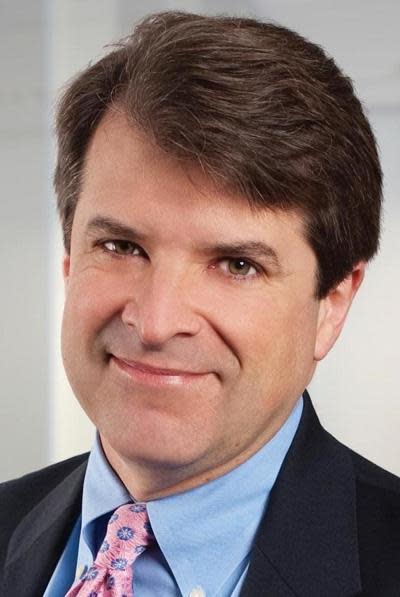Murphy: Columnist confronts the realities of aging with optimism
The boy looked down the street and saw a crowd.
He knew he was not supposed to leave the yard. Four-year-olds were supposed to stay close to home. Bad things happened to little boys who wandered.
But the allure of the group of children huddled beneath a towering pine was too great, and the Boy’s curiosity was too powerful.
So, against his mother’s wishes, the Boy left the yard to see what was happening.
The children were clustered around a tiny, squawking, hairless beastie with huge eyes, ragged claws, and flightless wings studded with the tiniest vestigial feathers.
“What is it?” the boy asked.

“It’s a baby blue jay. He fell out of the nest,” another kid said. “We’re hoping the mother bird will come and pick him up.”
Donnie, a skinny, sloe-eyed teenager with a droopy mustache, shook his head.
“The mother bird isn’t coming for him,” Donnie said.
“Yes, she will!” the boy exclaimed.
“She can’t fly for him,” Donnie said. “He can only fly for himself.”
At that moment, my own mother drove up in her white wood-paneled Ford station wagon.
“Mark Murphy! Get into this car and come home right this instant!” Mama exclaimed.
I never found out what happened to that baby bird. Although I know Donnie was probably right, a small part of me has stubbornly clung to the idea that the mother blue jay eventually swooped down from the tops of the pines and carried her wayward offspring back to the nest.
Optimism and aging
My unshakable faith that things will somehow always work out is, in microcosm, the story of my life. I’ve always felt I could find my way out of every predicament, escape any trap, and overcome any obstacle. I’m a natural glass-half-full optimist, even when optimism isn’t reasonable.
My mother died unexpectedly at 50. Only three years later, when I was 28, my wife Daphne was first diagnosed with lymphoma. Still, I remained inordinately positive, maintaining a persistent belief in the tattered vestige of my own invincibility.
However, as I’ve grown older, a subtle, grim realization has crept in: The River of Time never stops. Inexorable and relentless, it will eventually carry each of us to oblivion.
As a result, as a man of 61, I find myself grappling with the sheer inevitability of being mortal. Time has finally caught up with me.
A lifelong runner, I can no longer jog daily, or my knees will hurt. My exercise tolerance, which has always been exceptional, has begun to lag. I take medication for hypertension and hypercholesterolemia. The gray hairs I routinely pluck from my scalp are becoming too numerous to continue to thwart with that rude strategy. My father, who once seemed as solid as Gibraltar, died in December of pancreatic cancer. I’ve watched the sparkling veneer of my youth flake and chip away, and I now recognize it for what it always was: A shimmering mirage, an illusion.
In short, I’m getting old.
Some of this is amusing. Several of my employees were born after I started my medical practice 30 years ago. I’m hiring attending physicians younger than my children's ages. There are days when entire procedure rooms in our endoscopy center are staffed solely with millennials, recalling comedian Jerry Seinfeld’s pithy standup line: “Don’t let these young people fool you. They’re here to replace us.”
The silver lining (pardon the pun) is seeing the downstream effects of a lifetime’s efforts. My sons are grown, educated, and married to two wonderful women. The medical practice Ed Rydzak and I started 30 years ago is thriving, with well over 100 employees, including 20 medical care providers. I have a 6-year-old granddaughter, Violet, who is enthusiastic about everything in life—and I now have the unique pleasure of living vicariously through her young eyes, seeing her marvel at the world’s great mysteries for the first time.
Psychiatrist Elizabeth Kubler-Ross once wrote about the “Five Stages of Grief.” She defined them as Denial, Anger, Bargaining, Depression, and Acceptance. I grieved a bit over the loss of my youth, but I’ve now skipped straight from denial to acceptance. I know that my remaining time on earth is limited, and I’m strangely OK with that.
In a climactic scene in the science fiction classic “Blade Runner,” the replicant Roy Batty, played by Rutger Hauer, tells Harrison Ford’s character Deckard, as his life is ending, “I’ve seen things you people would not believe.”
As a middle-aged man, I now more fully appreciate the pithiness of Roy Batty’s statement. The essence is this: Life is beautiful, fragile, and far too short. It needs to be savored. Recognition of that fact has made me more grateful for every sunrise, appreciative of every experience, and considerate of the people I love.
When I was a wayward child, my mother came to get me and brought me home.
As a wayward adult, the way home is now clear―and I can fly there for myself.

This article originally appeared on Savannah Morning News: Savannah columnist skips from denial to acceptance over lost youth
